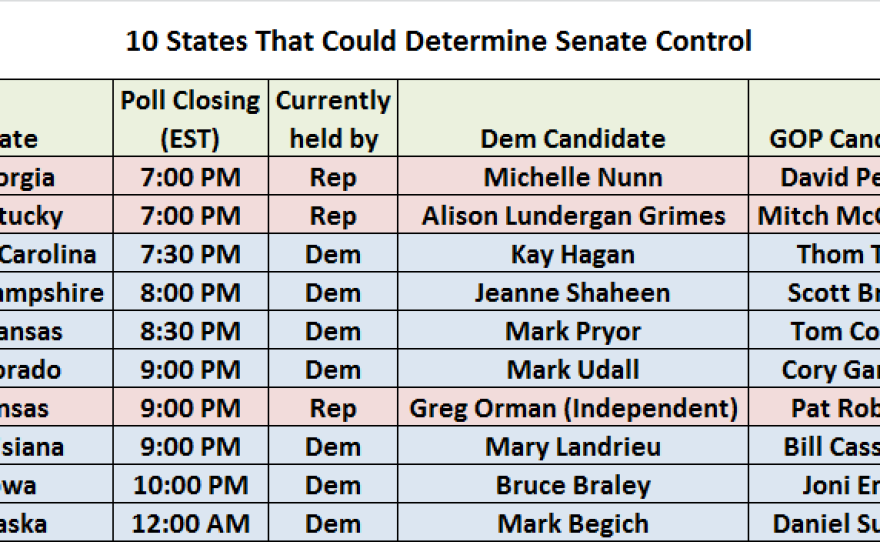
Kentucky Republican Mitch McConnell has easily won a sixth term in the U.S. Senate, but he'll have to wait a while longer to learn whether he's in line to become the majority leader next year.
McConnell defeated challenger Alison Lundergan Grimes by a wide margin, according to projections by the Associated Press. The race opened for McConnell, 72, in the final weeks of the campaign, as he emphasized his clout in the Senate. Grimes, Kentucky's Secretary of State, had tried to portray her opponent as a Washington insider who'd grown out of touch with the state. But Grimes suffered after she refused to say whether she had voted for the current president, Barack Obama, a misstep that drew national attention.
Republicans need to pick up just six seats to gain control, and while political oddsmakers say such a gain is likely, analysts have been confounded by an aggressive get-out-the-vote operation and persistent questions about whether traditional polling methods capture a younger, more diverse electorate that doesn't own landline telephones.
Early hints about the direction of the Senate could come in a handful of key states that have suffered long, expensive campaigns, including New Hampshire and North Carolina. But at least two closely watched Senate contests could be headed for runoff elections — Louisiana, in December, and Georgia, in early January. What's more: Alaska's polls don't close until midnight on the East Coast, with many ballots in far-flung locations that could remain uncounted for hours if not days.
"I would describe the race for the Senate as very, very close," says Jennifer Duffy, senior editor at the Cook Political Report. "We don't see a huge wave developing out there but we might see some ripples in some states."
This much is clear, says NPR political editor Charles Mahtesian: "The road to the Senate majority runs through the South."
Senate Races To Watch
Georgia
The race to replace retiring Republican Sen. Saxby Chambliss has been a tossup for weeks. Businessman David Perdue, a Republican running for national office for the first time, has come under fire for his support of outsourcing jobs and his comments on possible tax increases. Democrat Michelle Nunn, meanwhile, has been campaigning as a political moderate in the mold of her father, retired Sen. Sam Nunn, and her former boss, President George H.W. Bush, whose Points of Light Foundation she ran for years.
Alan Abramowitz, a political science professor at Emory University in Atlanta, says he wouldn't be surprised if neither candidate reaches 50 percent, setting up a runoff election in January 2015. "For someone like me, this will be like being in heaven," Abramowitz says. "But for the average person, I think they'll be bombarded by attack ads until Jan. 6."
North Carolina
Democrat Kay Hagan is vying for a second term in one of the most competitive races of 2014. She's defending the Affordable Care Act and trying to shrug off the unpopularity of President Obama. Her opponent is Thom Tillis, the Republican state House speaker. Democrats and minorities have been emphasizing Tillis' support of voting rights legislation in North Carolina that's considered the toughest in the nation, in part for its restrictions on early voting. Political analysts say the key to the race is whether Hagan persuaded voters to focus on Tillis and not the White House.
That theme, says Nathan Gonzales of the Rothenberg Political Report, resounds beyond North Carolina. "I think this election is about President Obama and it's up to Democrats to change the conversation," Gonzales says. "Wherever Democrats are successful in competitive races, it will be because they changed the conversation from President Obama."
Kentucky
If longtime GOP Sen. Mitch McConnell wants to become the majority leader next year, he'll have to win his own race for a sixth term in office first. McConnell, 72, has emphasized his clout in the Senate and his support for the local coal industry. Challenger Alison Lundergan Grimes, Kentucky's secretary of state, argues he's out of touch with voters and, in one ad, that he doesn't know how to brandish a hunting rifle. But Grimes has paid a price for refusing to answer whether she voted for President Obama. Recent polls show her trailing, and many political analysts believe McConnell now has the contest in hand.
Arkansas
Arkansas features another Democratic incumbent, Mark Pryor, struggling for re-election against Republican Rep. Tom Cotton. Cotton is an Iraq War veteran and rising star in his party who has been trending upward in polls. Pryor is the lone remaining Democrat to represent the state in Congress, but despite campaign support from Arkansas native and former President Bill Clinton, he may soon be out of a job.
Louisiana
Sen. Mary Landrieu wants a fourth term in office. But to get there, Landrieu will have to get past GOP challenger Rep. Bill Cassidy. Landrieu has been focusing her energy on get-out-the-vote efforts in New Orleans and forging her own path outside the shadow of the White House, but many political hands believe a runoff election in December is inevitable and that Landrieu would be the clear underdog.
New Hampshire
Incumbent Democrat Jeanne Shaheen is facing an unexpectedly difficult race against challenger Scott Brown, a former Republican senator from Massachusetts. Brown has stressed the Obama administration's handling of the extremist group that calls itself the Islamic State, and recent polls suggest the tactic may have helped close the gap with Shaheen.
Colorado
Republicans enjoy a real chance to pick up a seat in Colorado, bolstered by the strength of their candidate Cory Gardner, a House member who's made few mistakes on the campaign trail. Democrat Mark Udall, seeking a second term, has focused on women, running so many ads about reproductive rights that it has alienated men in the state as well as the editorial board of the Denver Post, which endorsed the challenger.
Iowa
In the fight to replace retiring Democratic Sen. Tom Harkin, Republican Joni Ernst appears to have an edge. Ernst has endeared herself to Iowans with savvy TV ads depicting herself as at home on the farm. That's an issue her opponent, Democrat Bruce Braley, fumbled when he appeared to disrespect the state's farming tradition. Braley, a former trial lawyer who has served Iowa in the House since 2007, has also been cast as litigious and ornery — a characterization at odds with Iowa's Midwestern politesse.
Kansas
Incumbent Republican Pat Roberts has been on the defensive for months after disclosures he no longer owns a home in the state he has represented for three terms. Challenger Greg Orman is a businessman running as an independent. Orman says he hasn't decided with whom he'll caucus if he wins the seat. But in the waning days of the race, Roberts has tried to argue Orman is really a Democrat masquerading as a maverick to win over voters.
House Races Of Note
In the House, there's far less suspense. Republicans currently enjoy a 234 to 201 majority and Democrats would need an overall pickup of 17 seats to seize control, a possibility that seems remote, at best. And if history is any guide: Midterm elections in a president's second term typically see a loss of 25 seats for the president's party, NPR's Mahtesian says.
"The president's low job approval rating has cast a shadow over the competitive landscape," says Gonzales of the Rothenberg Political Report. "The question is, how many seats do Republicans gain and are Democrats digging themselves into a hole it will take them multiple [election] cycles to get out [of]?"
Gonzales sees a rare chance, too, for House Republicans to diversify the overwhelmingly white and male caucus. He cites a likely victory by Mia Love, an African-American running for a House seat in Utah, and two credible openly gay GOP candidates, Carl DeMaio in San Diego and Richard Tisei, the former majority leader of the state House in Massachusetts, who's in a tough race against Democrat and former Marine officer Seth Moulton.
Another race to watch: whether John Barrow, the last white Democrat in the Deep South, can pull off yet another re-election in Georgia. Other incumbents, analysts, say, are mostly safe with a few prominent exceptions. One is Rep. Nick Rahall, a Democrat in West Virginia, who has been in the House since 1976. Another, New Hampshire Democrat Carol Shea-Porter, is fighting Republican opponent Frank Guinta for the third time in a row. She lost to him in 2010 but defeated him in 2012. The race revolves around her support for the Affordable Care Act, a law she says represents her proudest accomplishment.
And in Florida's Panhandle, Democrat Gwen Graham is giving two-time Republican incumbent Steve Southerland a run for his money. Graham, a lawyer, has enjoyed plenty of campaign cash and a boost from her father, retired senator and former Florida Gov. Bob Graham. Southerland, meanwhile, has attracted controversy for a men-only fundraiser and other missteps on the trail.
Across The Statehouses
Emory's Abramowitz echoes many political analysts when he calls the Florida gubernatorial race one of the most closely watched contests of the year. "Of all the governors' races, if I had to single out one, it would be Florida because it's such a big state and such a crucial state," he says.
Add in the characters: Incumbent Rick Scott, a Republican, earned his fortune in the health care industry before refashioning himself as "one tough nerd." But his awkwardness in office and in debates against opponent Charlie Crist, a former GOP governor now running as a Democrat, made national headlines and earned lampooning coverage on late-night TV shows.
In Wisconsin, all eyes are on Republican Gov. Scott Walker, an incumbent with presidential aspirations in 2016. Walker rose to national prominence by picking and winning a fight against public employee unions in the state. Walker's unpopularity is huge in the blue-state capital, Madison, and his challenger, Mary Burke, has attracted leading Democrats including President Obama to campaign alongside her.
In Kansas, Republican Gov. Sam Brownback is facing an unexpected challenge after his heavily promoted tax cuts put the state in an economic bind and alienated virtually all of Brownback's GOP allies. Abramowitz says a decision to vote Brownback out of office "could be sending a message to the Republican Party that if you push too hard, too fast, you lose your constituency."
Copyright 2014 NPR. To see more, visit http://www.npr.org/.






